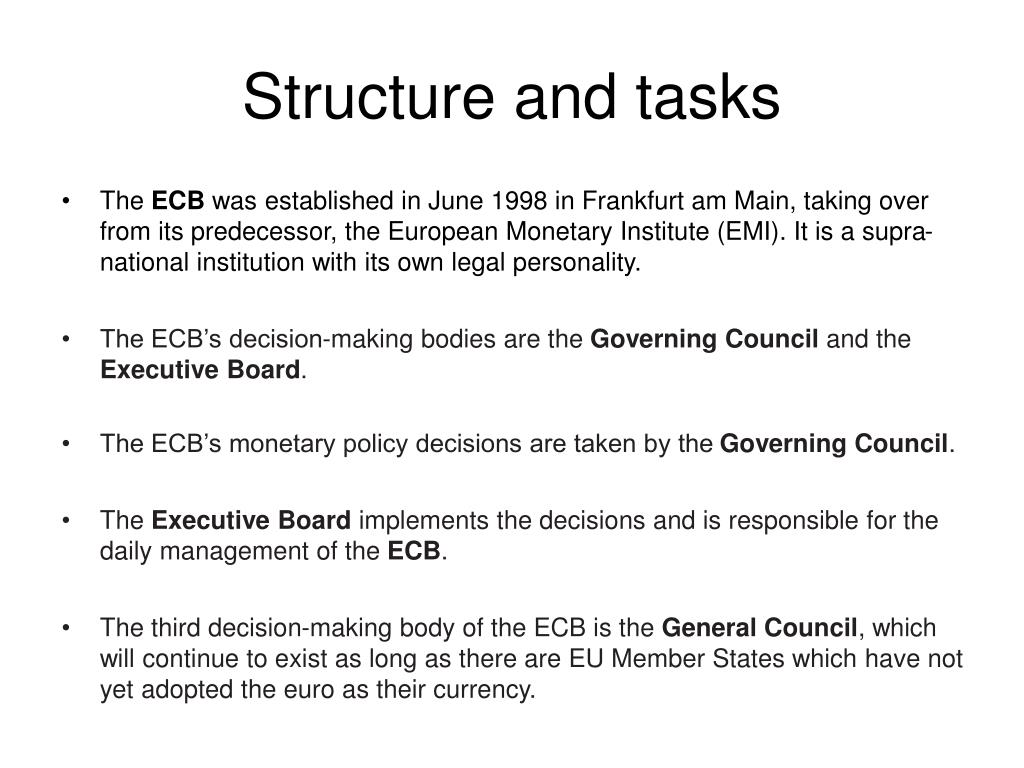European Central Bank Creates Task Force For Simpler Banking Regulations

Table of Contents
The Need for Simpler Banking Regulations
The current regulatory framework governing European banks is undeniably complex. Years of legislative additions and amendments have resulted in a dense and often contradictory set of rules, creating significant challenges for banks of all sizes. This complexity has far-reaching negative consequences, particularly for smaller banks and the overall climate for financial innovation.
-
High compliance costs burdening smaller banks: Smaller institutions often lack the resources to navigate the intricate regulatory landscape, leading to disproportionately high compliance costs that stifle growth and competitiveness. These costs can consume a significant portion of their budgets, diverting resources from lending and investment activities.
-
Complex rules hindering innovation and competition: The burdensome regulations act as a barrier to entry for new players and stifle innovation within the existing banking sector. Banks are forced to allocate significant human capital to regulatory compliance, leaving less room for developing new products and services.
-
Increased administrative burden for banks: The sheer volume of paperwork, reporting requirements, and internal controls needed to comply with existing regulations creates a massive administrative burden. This leads to inefficiencies, increased operational costs, and decreased agility.
-
Inconsistent application of rules across different jurisdictions: Variations in the interpretation and application of regulations across different EU member states create further complexity and inconsistencies, adding to the overall regulatory burden on banks operating across multiple jurisdictions.
While precise statistics on the total cost of banking regulation across the Eurozone are difficult to obtain, anecdotal evidence and industry reports consistently point to a significant financial burden, disproportionately affecting smaller institutions. This complexity directly impacts the competitiveness and stability of the European banking sector.
The ECB Task Force: Mandate and Composition
The newly formed ECB task force has a clear mandate: to identify and propose concrete measures to simplify banking regulations within the Eurozone. The task force's primary goal is to streamline existing rules, eliminate redundancies, and enhance clarity to create a more efficient and less burdensome regulatory environment. The timeframe for delivering its recommendations has not been explicitly stated, but the ECB aims for swift action to address the pressing need for reform.
The task force comprises a diverse group of experts, including:
- ECB officials: Bringing in-depth knowledge of the existing regulatory framework and the ECB's policy objectives.
- Representatives from national banking authorities: Offering insights into the practical application of regulations within different member states.
- Industry experts: Providing valuable perspectives from the banking sector itself, contributing real-world experience and understanding of the challenges faced by banks.
The task force will likely employ a multi-faceted methodology, including:
- Review of existing regulations: A comprehensive analysis of current regulations to identify areas of overlap, inconsistencies, and unnecessary complexity.
- Stakeholder consultation: Seeking input from banks, consumer groups, and other relevant stakeholders to ensure a balanced and effective approach to simplification.
- Best practice benchmarking: Examining regulatory frameworks in other jurisdictions to identify potential areas for improvement and best practices.
Potential Impacts of Simpler Banking Regulations
The potential benefits of simplified banking regulations are numerous and far-reaching. By reducing the regulatory burden, the ECB hopes to stimulate growth and enhance the competitiveness of the European banking sector.
- Increased efficiency for banks: Simplified rules lead to less administrative overhead, allowing banks to allocate more resources to core business activities.
- Reduced compliance costs: Lower compliance costs improve profitability and allow banks to invest more in innovation and customer service.
- Enhanced competitiveness in the European banking market: A level playing field encourages competition, leading to better products, services, and lower prices for consumers.
- Stimulated financial innovation: A less burdensome regulatory environment encourages banks to develop new products and services, fostering innovation and economic growth.
However, potential challenges and risks also exist:
- Potential unintended consequences: Simplification efforts must be carefully designed to avoid unintended consequences, such as increased systemic risk or reduced consumer protection.
- Impact on consumer protection: Streamlining regulations should not compromise the crucial safeguards for consumers.
Focus on Specific Regulatory Areas
The task force will likely focus on several key regulatory areas for simplification, including:
- Capital requirements: Reviewing the complexity of capital adequacy rules to ensure they are proportionate to the risks faced by banks of different sizes and business models.
- Reporting requirements: Streamlining the extensive reporting requirements to reduce the administrative burden on banks.
- Internal controls: Identifying areas where internal controls can be simplified without compromising risk management.
The Path Forward: Implementation and Monitoring
Implementing the task force's recommendations will require a multifaceted approach:
- Consultation process with stakeholders: A thorough consultation process will be essential to ensure that proposed changes are broadly supported and address the concerns of all relevant stakeholders.
- Legislative changes required: Implementing the recommendations will likely require changes to existing EU legislation, necessitating collaboration among EU institutions and member states.
- Monitoring metrics and reporting mechanisms: Robust monitoring mechanisms will be needed to track the effectiveness of the simplified regulations and identify any unintended consequences.
The ECB will need to establish clear monitoring metrics and reporting mechanisms to track the impact of the simplified regulations. This will involve regular reviews of the regulatory framework and ongoing dialogue with stakeholders to ensure that the reforms are achieving their intended goals.
Conclusion
The European Central Bank's initiative to create a task force focused on simpler banking regulations represents a significant step towards creating a more efficient and competitive financial landscape in Europe. By reducing the regulatory burden on banks, the ECB aims to unlock innovation, boost competitiveness, and ultimately benefit both the banking sector and the broader economy. The success of this initiative will depend on the careful consideration of all stakeholders' needs and a robust implementation and monitoring process. The focus on streamlining simpler banking regulations will be crucial for the long-term health of the Eurozone's financial system.
Call to Action: Stay informed about the progress of the ECB's task force and the implementation of simpler banking regulations by following our updates and engaging in the discussion. The future of European banking depends on these crucial reforms.

Featured Posts
-
 Anti Vaccine Activists Role In Hhs Review Of Autism Vaccine Claims Raises Concerns
Apr 27, 2025
Anti Vaccine Activists Role In Hhs Review Of Autism Vaccine Claims Raises Concerns
Apr 27, 2025 -
 Extreme Price Increases For V Mware At And Ts Concerns Over Broadcoms Acquisition
Apr 27, 2025
Extreme Price Increases For V Mware At And Ts Concerns Over Broadcoms Acquisition
Apr 27, 2025 -
 Pfc Accuses Gensol Engineering Of Submitting Falsified Documents Eo W Complaint Filed
Apr 27, 2025
Pfc Accuses Gensol Engineering Of Submitting Falsified Documents Eo W Complaint Filed
Apr 27, 2025 -
 Hhss Controversial Choice Anti Vaccine Activist To Examine Debunked Autism Vaccine Claims
Apr 27, 2025
Hhss Controversial Choice Anti Vaccine Activist To Examine Debunked Autism Vaccine Claims
Apr 27, 2025 -
 Federal Government Appoints Anti Vaccination Advocate To Lead Autism Study
Apr 27, 2025
Federal Government Appoints Anti Vaccination Advocate To Lead Autism Study
Apr 27, 2025
